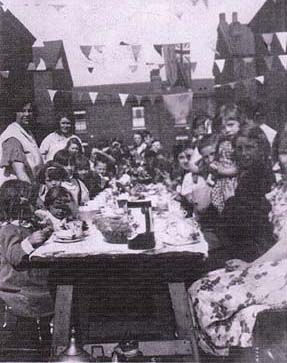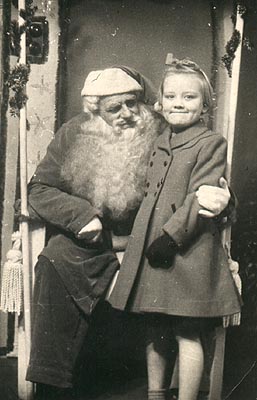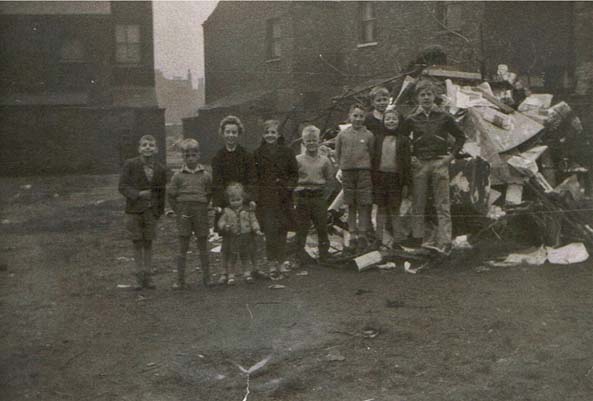|
Whitsuntide
In one
reference to Whitsuntide, the holiday was described as the birthday of
the Christian Church. Whitsuntide is the week following Whitsunday and
the eighth week following Easter. It is celebrated in commemoration of
the descent of the Holy Ghost on the apostles on the day of the
Pentecost. Whitsunday, the seventh Sunday after Easter, begins the week
and is believed to derive its name, White Sunday, from the
practice of wearing white robes for christenings on that day.
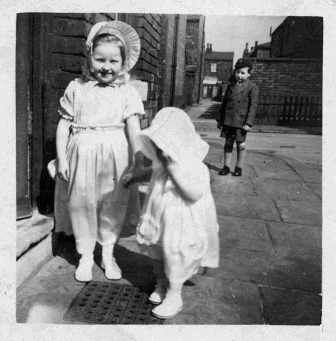
above: Whitsun
in Ross Place - picture donated by Vivianne Wainwright
According to Dr. Vanessa Toulmin of
Sheffield University, the practice of "walking" during Whit Week can be
traced back to Manchester. In the web site on the Warrington
Walking
Fair, she says:
The earliest
known "Walks" can be traced to Manchester around 1800. Walking Days or
Whit Walks as they became known sprang out of the Sunday School
movement first pioneered in 1784. The idea behind this movement was to
free the children:
Who worked
under wretched conditions during the week in the manufacturies... were
on Sunday allowed to run wild and free from all restraint.
To celebrate
the anniversary of the Sunday School movement in Manchester the
founders decided to assemble the children in St Anne's Square and
parade through the Market Square to attend church. Although these
parades became later associated with the Whit holidays and walks, the
main features of the walks, the parading of the churches, still
remained an intrinsic part of the tradition in Manchester well into the
1950s.
In "Manchester
- A Short History of Its Development," W. H. Shercliff has an account
of the centenary processions which took place in 1901:
The scene in
Albert Square this morning was one of exceptional beauty. At eight
o'clock the space in the square was so arranged by the marshalls that
the place of each school was indicated by a flag flying the Union Jack.
... Then for the next half-hour the different schools arrived in quick
succession, and the music of a dozen bands proceeded from all corners
of the square. ... There was a free mingling of colours, the cassocks
and hoods of the clergy contrasting sharply with the costumes worn by
the scholars. ...The Chetham boys wearing the quaint garments of the
school order formed a prominent feature. Nathaniel Drumville ...
unfurled his white flag to act as a baton and to the beating of his
time nearly 30,000 young voices sang the Old Hundredth. The schools
marched out of the square, the order being determined by the date of
consecration of their respective churches. At every point on the route
were gathered large crowds of sightseers.
Of the "Walks"
in Warrington Vanessa Toulmin said:
The Walks
would consist of the different church schools walking in procession
throughout the town and starting early on the Friday morning. From 1857
they were joined by the local Roman Catholics and by 1908 all the
different religious denominations in the town would have taken part in
the walk. However, it was not until 1920 that all followed the same
route. Prior to then the Church of England procession was the only
parade that met in Bank Park and marched past the Town Hall. Despite
various attempts over the years for the churches to walk together it
was not until 1995 after the IRA bomb had exploded in Warrington, that
this was finally achieved.
In her novel
"Shirley" Charlotte Bronté gives a vivid description of the Whit
Walks in Yorkshire. She describes them as "a joyous scene and a scene
to do good." In Saddleworth each church or chapel walked in the morning
and in the afternoon there were band concerts, cricket matches and
children's games.
Actually it all
seems rather tame compared to this account of Whitsun by Blount in
1679: "the custom is, that on Monday after Whitsun week, there is a fat
live lamb provided, and the maids of the town, having their thumbs tied
behind them, run after it, and she that with her mouth takes and hold
the lamb is declared 'Lady of the Lamb'... attended with music and a
Morisco dance of men, and another of women, where the rest of the day
is spent in dancing, mirth and merry glee."
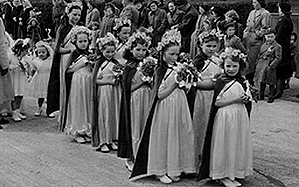
|
| St
Richard's - Sutcliffe Ave circa. 1951 photograph donated by Shelagh
Street |
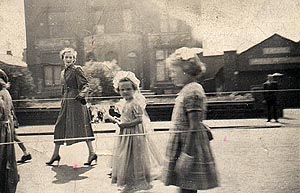 |
| Stockport
Road with the Halisbury Street Mission in 1953. The lady on the outside
is Mrs Jackson of 105 Earl Street. The photograph was donated by Pamela
(Greenhalgh) Pugh. |
Well I don't remember any sheep chasing in Longsight during Whitsun but
it was one of the most important dates on the social calendar. If you
look through the photograph collections of ordinary folk from the 50's
you notice something right away - almost all the pictures were taken
either on holiday, of which there were few, or on Whit Sunday. I think
the reason is obvious, because on our street that was when you got a
new outfit of clothes. Whit Sunday meant going around showing off your
new suit or dress, watching parades and, more often than not, an
afternoon in Platt Fields. We have very few family pictures but those
we have were taken of us and our neighbours in their best bib and
tucker outside our houses or up against a tree in Platt Fields.
I remember
going to Whit walks all day as a kid. We had local walks in Longsight
with bands and church banners and Rose Queens and girls in white
dresses.
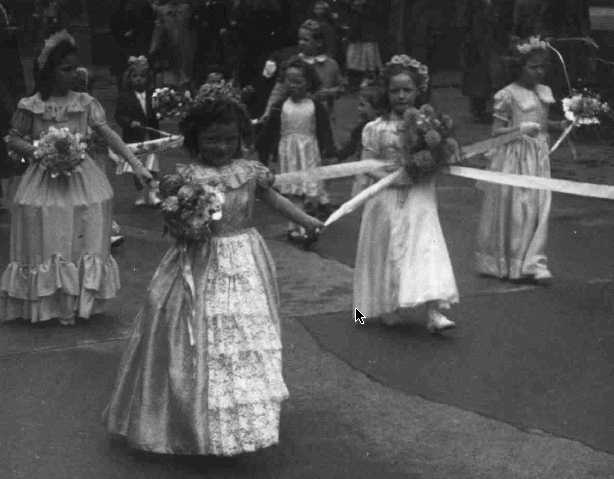
circa: 1953
(Courtesy of Lynda Lynch) - scanned by Ant
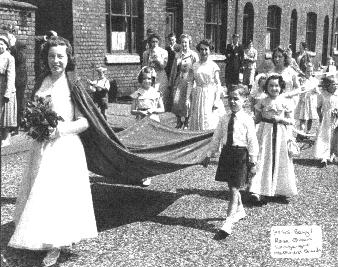
Beryl Bullock
- Rose Queen (Courtesy of Bill Bullock)
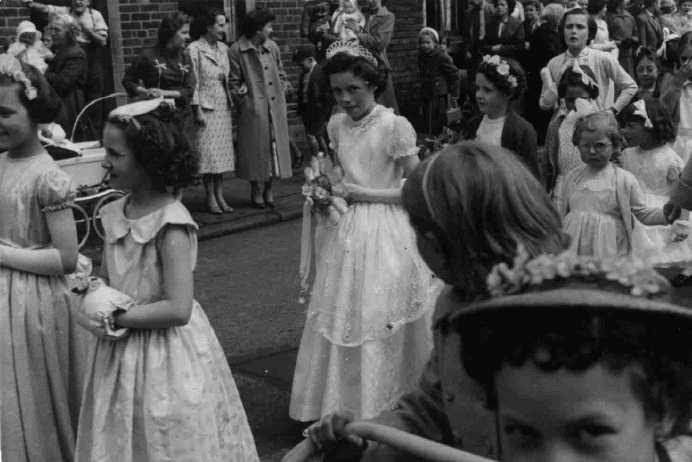
circa 1957
(Courtesy of Lynda Lynch) - scanned by Ant
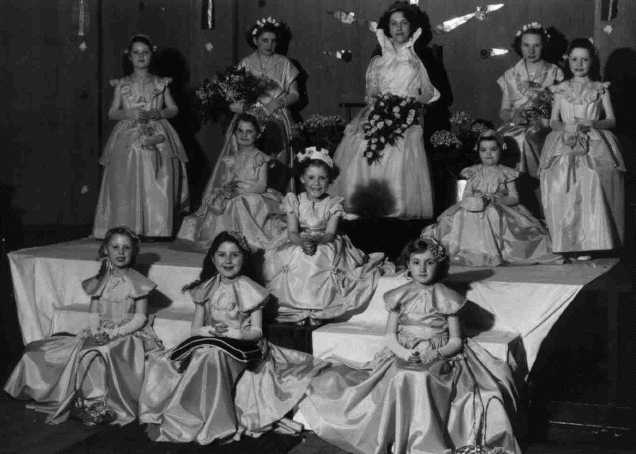
Rose Queen
(Courtesy of Lynda Lynch) - scanned by Ant
The local walks
were just the tip of the iceberg because in the center of Manchester
there were huge processions of all the Protestant churches and church
schools. I remember going on different occassions to see the Catholic
procession and the Ukrainian processions. I always liked those
processions best because in addition to the bands and the banners they
had groups of men carrying biers that held statues from their churches.
Of course, kids
will be kids and one thing about Whit Sunday we all looked forward to
was the fact that all the neighbours gave you a treat of money for
looking so posh in your new outfit. A pocketful of copper and
"frepneybits" and silver was the high point of the day. Much like
Halloween in North America the kids kept circulating around the street
to make sure they hadn't missed someone. For some reason we saw more
silver three penny pieces on Whit Sunday than any other time of the
year. We also saw more Kodak Brownies on Whit Sunday too, with parents
skenning into the little window on the top, turning it sideways to go
for a wide angle shot, holding their hand infront of the eyepiece to
cut the glare.
Often in the
afternoon we went up to "Kirky" Lane to catch the 53 bus for the ride
to Platt Fields. Platt Fields meant footie on the grass, maybe a game
of cricket, a row round the lake and without question an ice cream,
which I usually managed to drip on my new suit or even worse on my
suede shoes. If rowing was a bit too strenuous there was a bigger
powered boat you could take as a passenger for a cruise around the
lake. Then there was the sort of petting zoo at the back of the lake.
As I remember it was mostly rabbits and goats and guinea pigs.
Lynda Lynch was
a frequent participant in these walks and remembers them this way:
"Every Sunday
it was a case of wearing your Sunday clothes, not playing in the street
and attending Sunday School. Earl Street being the nearest one, was
where I was made to go every week. Even more so in the 1950s, girls did
what they were told, and boys did as they wished. This weekly
occurrence culminated in the Whit Walks something which in these days
have virtually ceased to exist."

Earl Street
Mission
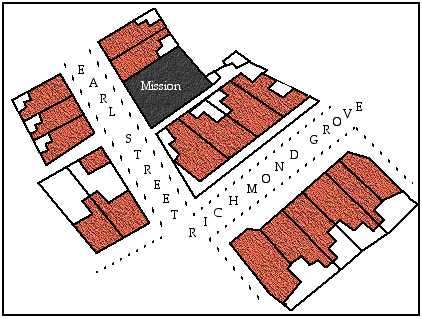
"My mother
made all my Whit Walk dresses and those of my friends too. It seemed a
strange ritual, as obviously money was short, yet we had our long
dresses, gloves, shoes, socks and also a new "day" outfit. This was to
be our new "Sunday Best". The clothes you wore to do your Sunday
visiting.
On Whit
Sunday the people of the parish met and with banners aloft, dressed in
our finery, we held the hands of our friends or a basket of flowers and
walked through the locallity no matter what the weather. People
clapped, cameras clicked and we all felt either embarrased or the "bees
knees". Mothers, fathers, grannies, granddads, brothers, sisters and
cousins, we all walked to celebrate Whit Sunday. Somewhere along the
lines was the service but I really don't know if that was before or
after the walk.
The Rose
Queen and Attendants must feature here too. They were elected, goodness
knows by whom, the congregation perhaps. Well my day did come, and was
I proud. My mother made all the attendants' dresses and that must have
been some task. The Rose Queen's attendants were called Rosebuds."
|
